Herod the Great
![]()
The title of this article is ambiguous. For other meanings, see Herod (disambiguation).
Herod (born 73 BC in Idumea, probably in Marissa; died March 4 BC in Jericho), also Herod the Great, was a Jewish client king of Rome.
His father Antipater managed the governmental affairs for the ethnarch and high priest Hyrcanus II from the dynasty of the Hasmoneans until his murder. Herod and his brother Phasael also became involved in these administrative duties. When the Parthians invaded Judea in 40 BC, they replaced Hyrcanus with his intra-family enemy Antigonos Mattatias. Herod fled to Rome. He enjoyed the confidence of Marcus Antonius. Therefore, the Roman Senate declared him a friendly king - at first a title without a country. Herod, with Roman support, conquered Jerusalem in 37 BC and ousted the Hasmonean family that had ruled until then. After the Battle of Actium, Herod switched to the camp of Octavian, who confirmed his kingship (30 BC) and expanded his domain. Herod's empire was a new kind of territorial structure with a multi-ethnic and multi-religious population.
Herod had married Mariamne, the granddaughter of Hyrcanus II, in 37 BC. She gathered a Hasmonean party around her at court and maintained contacts with Cleopatra VII. As a client of Marcus Antonius, Herod was forced to act defensively here. After he had switched to the camp of Octavian, he created clear conditions: He needed the sons from his marriage to Mariamne, but no longer Mariamne herself. In 29 BC Herod had the queen executed. He had two sons from this marriage, Alexander and Aristobulus, raised to succeed to the throne, but then felt increasingly threatened by the pair of brothers. Nevertheless, Alexander and Aristobulus were long involved in their father's system of government, reinforcing its legitimacy. But in 7 BC a Roman court sentenced them both to death for high treason. Herod now considered various candidates among his sons as heirs to his kingdom, a problem that remained unresolved to the end of his life.
Herod's reign is characterized by numerous large building projects, some of which are still preserved as ground monuments (Caesarea Maritima, Herodium, Masada, Jericho); however, the Jerusalem buildings, especially the new temple, were largely destroyed during the Roman capture of the city in 70 AD.
The biography of Herod was written by the Jewish Hellenistic historian Flavius Josephus: a rather positive portrayal in his work Jewish War (Book 1) was followed by a strongly negative-toned portrayal of Herod in his later major work Jewish Antiquities (Books 14 to 17). Josephus used the lost work of Nicolaos of Damascus, a scholar at Herod's court.
In the childhood stories of Matthew's Gospel, Herod plays a central role as rival and persecutor of the newborn Jesus of Nazareth (infanticide in Bethlehem).
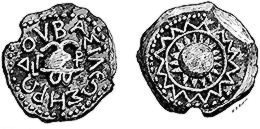
Copper coin of Herod: Obverse helmet with cheek guard, inscription: "of King Herod"; reverse Macedonian shield.
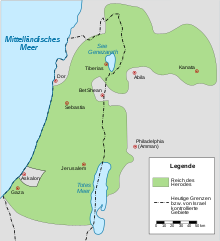
Herod's client kingdom. For comparison the modern territory of Israel including the territories controlled by Israel
Name
Herod bore a Greek name, attested in inscriptions and papyri also for other persons, derived from heros, "hero". The original form was Ἡρωίδης Hērōídēs, which was later contracted to Ἡρῴδης Hērṓdēs (with iota subscriptum). His name as a Roman citizen was Gaius Iulius Herod; posterity knew him as Herod the Great.
Live
Origin and youth
The world in which Herod grew up was Roman dominated. But the Roman Empire was in a situation of upheaval, which led to a deep uncertainty among the elites in the eastern Mediterranean region. It was hard to assess who was actually in power in Rome, and therefore which side to take. The population of the Levant was affected by the Roman civil wars through high war tributes, troop movements and plundering.
Herod was the second son of Antipater and his wife Kypros, a Nabataean woman. He had three brothers and one sister; his family belonged to the upper class of Idumea. The Idumeans had converted to Judaism in the 2nd century BC - this was a blemish from the point of view of the Jerusalem elite. Herod later had his court historian Nicolae of Damascus construct a family tree that made him a descendant of Jewish returnees from the Babylonian exile, "but he probably says this only to ... do a favor to Herod, who by chance became king of the Jews," Josephus critically noted. Herod enjoyed a Hellenistic school education, so that he could later be credited with a love of philosophy, history, and rhetoric. It corresponded to the same educational ideal that Josephus described him as a very good hunter and horseman as well as a successful athlete.
Idumea was a marginal region within the Hasmonean empire; opportunities for advancement were only available in the capital Jerusalem. Herod's father Antipater successfully took this path. He was political advisor to the ethnarch and high priest Hyrcanus II, but also gained a good reputation in Rome, as he provided military support on several occasions. In the power struggles within the Hasmonean family, Antipater stood loyal to Hyrcanus. "Rome, on the other hand, was the all-dominant power to which one had to remain loyal; Pompey, Gabinius and all the other personalities were merely the interchangeable representatives of this power," thus Ernst Baltrusch characterizes the basic lines of Antipater's policy, which Herod learned from his father, so to speak.
From 48 BC, Hyrcanus II confined himself to his religious office as high priest and left the defense and taxation of the empire to Antipater; the latter involved his two sons Phasael and Herod in these tasks. In 47 BC Antipater acquired Roman citizenship and was admitted to the gens Iulia. Antipater appointed his elder son Phasael as strategos of Jerusalem; he made the still youthful Herod strategos of Galilee. There Herod cracked down on rebels, whom he arrested and executed without trial. Because of the executions, he had to answer to the Synhedrium in Jerusalem. This body underestimated how strongly Sextus Iulius Caesar, the governor of Syria, supported Herod. Herod was released; the Jerusalem elite had learned that Rome was behind Herod and his family.
After Antipater was poisoned by Malichos, a domestic political rival, in early 42 BC, the region sank into chaos for five years. In Tyros, Roman soldiers slew Malichos, but his brother continued the struggle against the Idumean brothers Phasael and Herod. Other local players intervened: Helix in Jerusalem (possibly a bribed Roman official), Marion of Tyros who became active in Galilee, Ptolemy of Chalcis, and a prefect named Fabius appointed by Cassius in Damascus. The high priest Hyrcanus was pressed by his intra-family rival Antigonos Mattatias and relied on Phasael and Herod to maintain power. To secure the brothers' support, he promised Herod his eleven-year-old granddaughter Mariamne as his future wife. Herod disowned his first wife Doris, with whom he had a son Antipater. (This Doris, who would later return to court with her son, was Jewish from an upper-class Jerusalem family).
In the autumn of 42 Cassius and Brutus were defeated in the double battle at Philippi; thereafter the Levant was part of the sphere of power of Marcus Antonius, and he traveled about to make himself known to the local elites. "Antony was not interested in who was legitimate for office, but solely in who was suitable and loyal to him." He confirmed Hyrcanus as high priest and ethnarch, and conferred on Phasael, Herod, and Pheroras, a third brother, the somewhat vague title of tetrarch, which specifically meant that, in addition to their previous powers as strategists, duties of their murdered father also passed to them. On his coinage Herod counted his reigning years from this appointment as tetrarch (42 BC).
Rex amicus et socius (40-31 BC)
In 40 BC the Parthians invaded Judea; they installed Antigonos Mattatias as king in Jerusalem. Herod left his family under the protection of a military unit on Masada. He fled to the Nabataean kingdom. The Nabatean king Malichus I stalled him, so Herod eventually traveled on to Alexandria - where he also found no support with Cleopatra VII. He then arrived in Rome by sea, begging for protection: penniless and thus of no value militarily to his Roman interlocutors. But he had to offer his knowledge of the internal structures in Judea and Idumea. The fact that he was not of priestly family and therefore could not develop ambitions for the high priesthood was an advantage from the Roman point of view. Since Herod could not legitimize himself religiously, recognition by Rome henceforth formed his basis of power. Thus, under the second triumvirate, consisting of Octavian, Marcus Antonius and Marcus Aemilius Lepidus, he was appointed king (rex amicus et socius):
"The senate was summoned, and Messala, and after him Atratinus, introduced Herod, gave a running account of his father's good deeds, and recalled his own benevolence towards the Romans. At the same time they denounced Antigonus and declared him an enemy, ... because, bypassing Rome, he had received his dominion from the Parthians, which the senate noted with indignation. Antony now arose and pointed out to the senators that it would also be of use in the war against the Parthians if Herod became king. This opinion was approved by unanimous resolution."
- Flavius Josephus: Jewish Antiquities 14,384f.
However, Herod initially had only the title and no land: "A personality who is perhaps particularly qualified, but not entitled, receives the title of king from a foreign power without a fixed spatial boundary, with the task of establishing himself there," Ernst Baltrusch comments on the unusual situation. Together with the Roman legion commander Gaius Sosius, Herod conquered the territory assigned to him from 39 to 37 BC, whereby Herod was given the task of mobilizing local troops.
According to Baltrusch, it was also a war for interpretive sovereignty. As the first Hasmonean, Antigonos Mattatias fell to depicting Jewish cult implements on coins and thus emphasizing his religious legitimacy. Herod could not compete with Antigonos in this field. Some of his political opponents disputed that Herod the Idumean was a full member of their religion. Consequently, he issued some coins open to many interpretations and thus appealing to many segments of the population. Recognizable on them are the tripod (piety), helmet (fortitude) and palm branches (peace). While the Roman troops quickly succeeded in beating back the Parthians, Herod had a hard time. Without the Hasmonean high priest Hyrcanus II at his side, he lacked legitimacy, gained few supporters, and occasional Roman relief efforts increased popular rejection by their brutality. In this situation Herod, in the midst of war, forced a marriage with Mariamne, just 16 years old. It took place in Samaria in the spring of 37. Marrying Mariamne brought Herod great advantages, since the children from this marriage would be Hasmoneans and thus acceptable to that part of the Judean elite that still sympathized with the former ruling house. Significantly, the sons from Herod and Mariamne's marriage bore the dynastic names Alexander and Aristobulus.
The war ended with the capture of Jerusalem; Herod narrowly avoided a massacre of the city's population by his soldiers. This is also a symptom of the tensions that existed within Judaism between Judeans and populations that had converted to Judaism during the Hasmonean period (Galileans and Idumeans). Antigonos Mattatias was executed by order of Marcus Antonius.
Cleopatra VII was interested in reintegrating Koilesyria into the Ptolemaic dominion. This endangered Herod's already unestablished rule in Jerusalem. But Mark Antony did not yield to her on this point and stuck by Herod. By taking the Hasmonean group around mother-in-law Alexandra and wife Mariamne under her protection at Herod's court, she forced Herod to act defensively towards his domestic opponents. Marcus Antonius made Cleopatra the owner of the productive palm and balsam groves of Jericho in 36 BC, and Herod had to lease them from her. The Nabataean king Malichus I was in the same situation; the relationship between Herod and him was further strained because he had not supported Herod in his flight from the Parthians at the time. War broke out between Herod and Malichus in 32 BC because of a conflict over the payment of rents. Several battles took place in the Hauran. In the late summer of 31, Herod achieved a decisive victory at Philadelphia (Amman). Flavius Josephus suggests that Cleopatra had pushed Herod into the war against Malichus, which is partly accepted by research, partly rejected as downright suicidal weakening of his own position in the conflict with Octavian.
After his patron Marcus Antonius was defeated in the battle of Actium, Herod transferred his loyalty to the victor Octavian. Josephus described it this way: Herod had omitted to support Marcus Antonius with ships and soldiers, and after the battle had asked Octavian for forgiveness for not having helped his patron in an appropriate way. This mistake Octavian gladly forgave him. The episode is often regarded as an invention of Josephus, but it is plausible in itself.
Years of stable government (30-12 B.C.)
In 30 BC Octavian confirmed Herod at Rhodes as king of Judea - "notwithstanding the part he had played in Antony's system of rule", and included him in his amicitia. Moreover, after a kind of probationary period, he was given more territories to add to his domain.
For the Hasmoneans at Herod's court it was directly noticeable that they had been under the protection of Cleopatra and that Herod did not have to take any more consideration after the agreement with Octavian. He needed the children from this marriage for the succession arrangement, but he no longer needed his mother-in-law and his wife: in 29 BC Herod had Mariamne executed, and a year later Alexandra. Around 23/22 BC, Augustus granted Herod the right to name a successor. The choice fell on the princes Alexander and Aristobulus; they were carefully educated and spent five years in Rome, until Herod brought them back to Judea with him on his return visit to Rome. Marriages suitable to their station were now arranged for them. It soon became apparent that the two princes were cultivating their Hasmonean identity more than expected, and that the Idumean group at court around Herod's sister Salome was deeply suspicious of anything Hasmonean. But until the condemnation and execution of the pair of brothers (7 B.C.), the two were thoroughly integrated into Herod's system of government and reinforced his fragile legitimacy.
Herod honored his Roman patrons by naming building projects after them (Caesarea, Sebaste, Agrippeion, Antonia, Julias). In Jerusalem, his capital, he showed himself a benefactor in Roman style by building a new theatre and amphitheatre (27 BC) and founding the "isactic" games: athletic, musical and dramatic contests and horse races. Animal races were performed; visitors to the city were impressed, but among the population these projects met with rejection (according to Josephus), as they were against tradition.
In Jerusalem Herod had the Jewish temple rebuilt. A generous esplanade created space not only for the actual temple house with the inner temple courts, but also for the outer forecourt with surrounding porticoes.
After the Sabbatical year 29/28, in which agriculture rested, a severe drought year followed in 28/27. Famine and disease were rampant. Herod used his private fortune and even had his art treasures melted down to buy grain for the population in Egypt. Thanks to good relations with Publius Petronius, the prefect of Egypt, he was given preferential treatment among those interested in buying. Herod organized the distribution of the grain in an exemplary manner. He was able to take propaganda credit for the entire operation; but at the same time, even in this emergency, he was able to fulfill his duties as a friend of Rome and provided a contingent of 500 elite soldiers from his bodyguard for the campaign of Aelius Gallus into southern Arabia. The next sabbatical year, 22/21, was again followed by a bad harvest; this time Herod reduced taxes by one-third for all the inhabitants of his kingdom.
In 22 BC, the development of the seaside city of Caesarea Maritima and its harbour began. The urban planning concept is interesting for the policy with which Herod tried to integrate the different population groups of his empire. Caesarea's inhabitants were half Jewish and half Gentile, but Herod's building project created a distinctly Roman city: visitors arriving by ship first saw the elevated temple of Roma and Augustus.
The year 15 B.C. brought Herod a great political success: he succeeded in winning over Marcus Vipsanius Agrippa, Augustus' closest confidant, for a tour of Judea during Augustus' journey to the Orient. He was able to show him his newly built cities in Roman style, his palace fortresses (the region was thus also militarily secured) and the magnificently developed metropolis of Jerusalem. The population cheered the Roman guest; the latter, the co-emperor, had sacrifices offered in his name to the god YHWH in the temple and thereby upgraded the Jewish religion in the Roman Empire. Tentatively, the small theater of Herodium has been associated with Agrippa's visit by the excavator Ehud Netzer. It had a royal box, "a structural unicum in Greco-Roman theater construction." The walls are painted in the 2nd Pompeian style. Singular to this region are a series of illusionistic imitation windows that provide views of a Nile landscape.
Herod established a reputation in the eastern Mediterranean as an enthusiastic and extremely generous philhellene. He supported the financially struggling Olympic Games and thus secured their future. On his trip to Rome in 12 B.C., he was probably given the honor of presiding over the games of the 192nd Olympiad in gratitude, which must have brought him great prestige in the Greek world. With Athens, another symbolic place was bestowed with benefactions by Herod. According to Josephus, he gave consecration gifts. The bases of two statues of Herod erected at Athens have been preserved; one inscription praises him as a friend of the Romans, the other as a friend of the emperor. It has been suggested that Herod also had the temple of Roma and Augustus built on the site of the Acropolis. At Seia (Sīʿ) near Qanawat there was a statue of Herod in the temple of Baal Shamim. On the island of Syros, three fragments of an endowment inscription of Herod were found; however, this inscription may have come from the island of Delos. At Berytos, according to an inscription, Herod Agrippa II and Berenice restored something "which their great-grandfather Herod had built. “
Crisis years of government (12-4 B.C.)
The crisis-ridden last phase of the reign began with Herod suddenly making a change in the succession arrangements. About 14/13 BC he brought his first wife Doris back to the court and took measures to compensate for the neglected education of his eldest son Antipater. The latter was now also sent to Rome. There was considerable tension at court, as Herod had reached an advanced age for the time, and the courtiers were probing whether to join one of the circles of friends of the two sons of Mariamne. By bringing a new contender for the crown to the court, Herod's situation spiraled out of control. "The exact sequence of events reads little differently in Josephus than a staged Hollywood family soap opera or even absurdist theater." Antipater soon had a circle of friends of his own, which he used to denounce the two sons of Mariamne to Herod - he himself kept a low profile. These, in turn, appeared quite openly with the claim that their Hasmonean origin legitimized them to rule, and announced their intention to demote the king's non-Hasmonean wives with their offspring to weavers and village scribes in the future. This brought the "Idumeans" around Salome and the suddenly newly formed circle around Antipater closer together, although it remains unclear who supported Antipater, possibly parts of the Jerusalem upper class from which his mother came.
In 12 B.C. Herod denounced the two princes from his marriage with Mariamne to the emperor for attempted poisoning. He took them both to Aquileia, where the trial was to take place; but Augustus insisted that the three reconcile. Herod arranged his succession so that both Alexandros and Aristobulus would be elevated to royal rank, but Antipater would be superior to them. Augustus confirmed that Herod had the right to arrange his succession in this way.
Typical of a patronage king, Herod strengthened his relationship with the emperor through large, formally voluntary gifts of money and was in turn rewarded by the latter with privileges. Thus he gave Augustus 300 talents (7.5 million sesterces) in gratitude for the reconciliation with his sons brokered by the latter. In return, Augustus ceded to him half the yield of the copper mines of Cyprus, thus facilitating Herod's own coinage (gold and silver coins were not allowed to be minted by client kings).
At the end of his reign, Herod temporarily lost the position of trust with Augustus that he had long been able to maintain. The background was a revival of the old conflict with the Nabataeans since about 14 B.C. Herod snubbed the Nabataean chancellor Syllaios, who wished to marry Herod's sister Salome, by making his conversion to Judaism a condition. Syllaios then supported insurrectionary movements in Trachonitis with his own mercenaries, and Herod intervened there militarily in 9 BC. Syllaios then sued Herod before the emperor. Herod's court chronicler Nikolaos of Damascus was able to refute the accusations in Rome, and Augustus sentenced Syllaios to death. In the same year, 9 BC, Aretas IV had succeeded to the throne at Petra without first being confirmed by the emperor. Augustus then considered adding the Nabataean kingdom to Herod's domain. In view of Herod's age and the imponderables of his succession, however, he decided against it.
After a suspicion launched by Antipater, Herod charged the sons of Mariamne with high treason. Augustus gave him permission to take legal action against his sons, i.e., he had the power to save them, but failed to do so. The trial took place in 7 BC at Berytos (Beirut) before a Roman court. It was a show trial of sorts, where the issue was not the verdict of guilt, but the sentence - Herod was unsure of that. But given the stirred emotions in the kingdom and in his court, neither imprisonment nor banishment was an option. The brothers were strangled at Sebaste and then buried at Alexandreion. According to Josephus, the death sentence for the princes was the result of court intrigue. It was obvious that they hated their father because of the execution of their mother. But for Herod there may also have been a power-political reason to have the pair of brothers executed: the likelihood that there would be a struggle between the two for the succession to the throne and thus a civil war after Herod's death. In any case, Herod thereafter presented himself as a loving grandfather who wanted to see to the education and marriage of the orphans. Antipater prevailed upon Alexander and Tigranes, Alexander's two sons, to be removed from the Jerusalem court and deported to Cappadocia, from where their mother Glaphyra came. There they both later made a career for themselves.
The succession was changed so that Antipater should become the sole heir to the throne. As his heir he placed his about 15-year-old son Philippos from the marriage with Mariamne II. Obviously the choice fell on him because he came from a high priestly but not Hasmonean family. But in 6 BC, after further court intrigue, Herod divorced Mariamne II and deposed her father as high priest; this left Antipater as sole heir to the throne. His flaw, however, was that he had no noble ancestry and was born before Herod's rise to power. Moreover, his circle of friends, which he had cleverly used to denounce his two half-brothers, now placed him in latent opposition to the king himself. Antipater was shortly afterwards tried for high treason. The verdict of guilty had first to be approved by the Roman emperor. Herod was by then stricken with a serious illness. Emperor Augustus approved the death penalty for Antipater, which was carried out in prison a few days before the death of his father (4 BC).
Last measures of Herod and death
The new succession plan divided the kingdom between two sons Herod had with the Samaritan woman Malthake, and one son whose mother was a Jerusalemite. Herod Archelaus was to rule as king over the whole of Herod's kingdom, while Herod Antipas was to rule as tetrarch over Galilee and Perea, and Herod Philippos as tetrarch over Gaulanitis (Golan), Trachonitis, Batanaea and Panias. According to Samuel Rocca, these inheritance arrangements show that Herod was mentally confused at the end of his life: he valued Herod Antipas as much as he hated the other two heirs. While at least the fact that his mother came from the Jerusalem upper class, which would be welcomed by a part of the population, spoke for Herod Philippos, no reason can be found for the preference of Herod Archelaos in the inheritance regulations.
Already deathly ill, Herod learned that some young people were publicly chopping off a golden eagle above the "great gate" of the temple, because it was a violation of the prohibition of images and a symbol of Rome. Behind the action were Judas and Matthias, two Pharisaic teachers. The eagle had been in this location for over a decade, was an ambiguous symbol in this region and time, and had not previously been disturbed. Here it showed a deep dissatisfaction with the government of Herod, whose control was increasingly slipping away in the last months of his life. The temple police seized the offenders. Herod regained his strength to the point where he was able to accuse them of being temple desecrators before Jewish notables in Jericho, remembering himself as the builder of the temple. The death penalty for the provocateurs was thereafter a matter of course. No matter how the golden eagle may have been meant when it was attached, in this conflict it was a symbol of Roman rule.
After these events in February/March of the year 4 BC Herod's health deteriorated more and more. His sufferings were described in detail by Josephus, but since the agonizing end of villains is a topos, the real illness of Herod can only be assumed: Diabetes, colon cancer, or terminal cirrhosis of the liver with concomitant arteriosclerosis. Shortly before his death, according to Josephus' account, Herod had the most respected Jewish men from all over the country locked up in the hippodrome at Jericho. He continued:
"I know that my death will be a feast of joy for the Jews. But I have the power ... to obtain a magnificent funeral celebration. ... Soldiers shall surround those arrested men and kill them at the moment of my death, so that every family in Judea may weep over me against their will!"
- Flavius Josephus: Jewish War 1,659f.
Herod's sister Salome and her husband Alexas, however, disobeyed the order and released the men. According to Ernst Baltrusch, this text can be interpreted in two ways:
- The imprisonment of the elite could have been meant as a hostage-taking to prevent serious unrest after the news of the death became known (according to Walter Otto, who saw in it a "proof of his great art of government" which Salome had thwarted).
- The story can be emblematic of Herod's failure to be recognized as king by his Jewish subjects.
Herod had not achieved complete, but very extensive autonomy within the empire during his reign. But he did not succeed in stabilizing the conditions in Judea beyond his death with a succession plan. Despite all the plots and murders in the last years of Herod, which were motivated by the struggle for the succession - not Herod himself, but Augustus decreed it. Probably because the grandsons were very young, the emperor divided Herod's empire into three parts. Herod Archelaus, the heir named in the will, was granted the rule over the heartland (Judea, Samaria, Idumaea) on probation, but was withdrawn after failure.
Tomb of Herod
Flavius Josephus wrote that Herod had the palace fortress Herodium built as his burial place and indeed, after he died in Jericho, was also transferred in procession to Herodium and buried there. Since he named the palace complex after himself, it is generally assumed that Herod wanted to be buried here.
Ehud Netzer declared that after a long search he had located Herod's tomb in Herodium, some twelve kilometres south of Jerusalem in the West Bank. Netzer's team followed the hypothesis that the palace fortress on the summit of the cone-shaped mountain (Upper Herodium) was out of the question as a burial site, since the Jewish religion provides for a clear separation between tombs and the living quarters. All the more so, as no trace of a tomb has ever been found on the summit. Therefore, the tomb was searched for inconclusively in the palace and administrative wing at the foot of the hill (Lower Herodium) and finally concentrated on the area of a monumental staircase, already mentioned by Josephus, which connected the upper and lower palaces. A vaulted passageway discovered in this area halfway up the slope could not be interpreted at first. In April 2007, the team found fragments of an elaborate sarcophagus made of reddish limestone nearby. Underneath, they uncovered a square podium that Netzer identified as the base of Herod's tomb. On April 10, 2007, this find was announced to the media.
In October 2013, archaeologists Joseph Patrich and Benjamin Arubas cast doubt on the identification of the resting place as Herod's tomb. According to Patrich and Arubas, among other things, the comparatively small resting place does not fit the monumental style of the ruler. Roi Porat, who took charge of the excavation after Netzer's death, rejected the arguments as not valid. Patrich and Arubas have since elaborated their criticism of the interpretation as Herod's tomb.
From February 2013 to January 2014, the Israel Museum in Jerusalem hosted a special exhibition entitled "Herod the Great - the King's Last Journey". It was also dedicated to the life's work of Ehud Netzer. His excavations in Herodium and the sarcophagus found there had a prominent place. Criticism was sparked by the fact that the exhibits came in large part from excavation sites in the Palestinian Territories. A spokesman for the Israel Museum said they considered the objects only on loan and would return them to the excavation sites a few months after the end of the special exhibition. In 2020, the sarcophagus is apparently still in the Israel Museum.
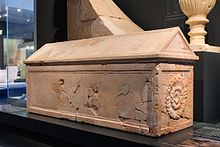
Restored sarcophagus from the tomb attributed to Herod by Netzer (Israel Museum, 2016).
!["Always he [Herod] was an excellent hunter, and in this his skill in horseback riding served him in a high degree." Hunting scene, detail of the so-called Sidonian tomb (2nd century B.C.) in Herod's presumed birthplace Marissa (2011)](https://alegsaonline.com/image/220px-Hunting_mural_scene_on_the_Hellenistic_tomb_paintings_at_Sidonian_Burial_Caves.jpg)
"Always he [Herod] was an excellent hunter, and in this his skill in horseback riding served him in a high degree." Hunting scene, detail of the so-called Sidonian tomb (2nd century B.C.) in Herod's presumed birthplace Marissa (2011)

Hippodrome with sea view in Caesarea Maritima (2014)
.jpg)
Partial reconstruction of the caldarium of the thermal complex at Herodium (Israel Museum, 2018).
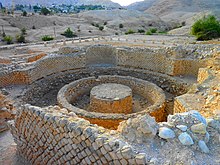
Cold bath room with opus reticulatum in one of the Herodian palaces at Jericho (2011). This typical Roman wall facing was initially largely confined to Italy, but during the Principate it is encountered in some building projects of Oriental client kings.
.jpg)
Fresco depicting a landscape from the royal box in the theater of Herodium (Israel Museum, 2018).
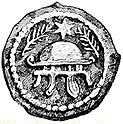
Coinage of Herod, Samaria ca. 40 B.C.: Helmet with cheek flaps and star as decoration, two palm branches
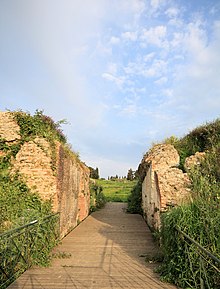
Entrance of the stadium of Nikopolis. Here "isactic" competitions were introduced in memory of the victory at Actium. Herod participated financially in the construction of this "victory city" and founded "isactic" games in Jerusalem after its model
Questions and Answers
Q: Who was Herod the Great?
A: Herod I was a ruler who was king of Judea from 37 to 4 BC.
Q: What was the political status of Judea during Herod's reign?
A: Judea was a client state of Rome at the time of Herod's reign.
Q: What was Herod known for during his reign?
A: Herod was an excellent administrator during his reign.
Q: What is the Bible account associated with Herod the Great?
A: The Bible account associated with Herod the Great is his killing of the boys of Bethlehem.
Q: Is the massacre of innocents attributed to Herod the Great confirmed by other historical records?
A: No, the massacre of innocents attributed to Herod the Great is not confirmed by other historical records.
Q: Who did Herod murder during his reign?
A: Herod murdered countless rivals, a mother-in-law, a wife, and three of his sons during his reign.
Q: How long was Herod the Great's reign?
A: Herod the Great's reign lasted 33 years.
Search within the encyclopedia